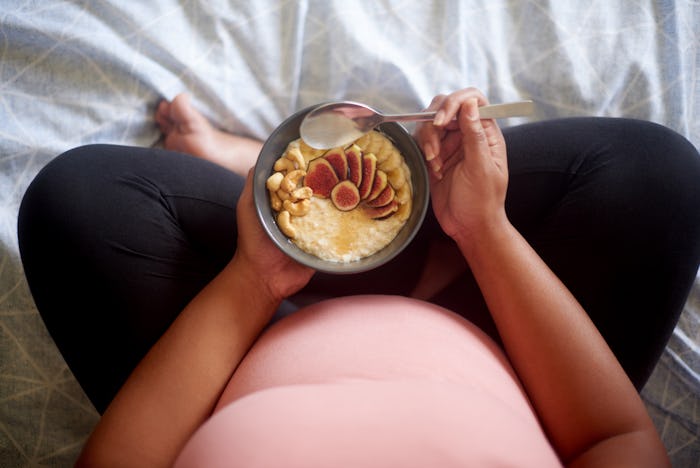It's NBD

You Don't Have To Eat (Or Avoid) Certain Foods Before A One-Hour Glucose Test
Eating how you normally would is the best thing you can do.
If you’re getting near the end of your second trimester, your glucose tolerance test should be coming up — the oft-discussed screening in which you chug a sugary beverage in front of a nurse and then wait patiently for an hour to have your blood drawn and your blood sugar checked (all in the name of making sure you don’t have gestational diabetes). So, what can you eat before your one-hour glucose test, if the whole point is having the right blood sugar levels?
A standard gestational diabetes screening usually takes place between 24 and 28 weeks gestation, and goes something like this: you’ll head to your OB-GYN’s office and be given a glucose drink, which you have to finish within five minutes. Then, you’ll wait one hour to have your blood drawn, during which you can’t eat or drink anything. As for what you can eat before, well, doctors just ask that you eat a good meal, whatever that usually means for you.
What to eat before a one-hour glucose test
There are no hard and fast rules about what you can or can’t eat before a glucose test, says Dr. Sima Baalbaki, M.D., board-certified OB-GYN and assistant professor of obstetrics and gynecology at University of Alabama at Birmingham. Have your go-to weekday breakfast and coffee, for example. That said, it’s probably not wise to down a Snickers or a sweet tea right before your appointment, she says, since you’ll be drinking a sugar-heavy beverage once you get there as it is.
“I tell people to eat a sensible meal, to eat normally. Don’t overindulge in sweets that day. But also, self-restricting and not having sweets or not eating anything is not necessarily going to change the results of the test.” Baalbaki says she has had patients come in for their test and tell her they haven’t had sweets in a month in order to prepare. Avoiding foods high in sugar in the short term is not going to change whether or not you develop gestational diabetes, she says, and you should not alter your eating habits in an attempt to “pass” your glucose tolerance test.
“I would not recommend deliberately changing diets for the test. The goal is to know what you are doing in general as that informs guidance for overall glucose control,” says Dr. Zhaoping Li, M.D., division chief of the clinical nutrition department at UCLA Health.
You should also not fast before the one-hour test, Baalbaki says. No need to make yourself feel faint. “Gestational diabetes is related to changes in physiology, and it’s a development of carbohydrate intolerance during pregnancy. Avoiding sweets or not eating is not going to change that for the test. No one gives themselves gestational diabetes, it's just something that happens to people.”
So, eat something you normally would for breakfast or lunch ahead of your appointment. You want to know if your body is suddenly not handling your usual diet the same way. “Our ultimate goal is that you have a safe and healthy pregnancy. If that means that we need to monitor your blood sugars, or we need to treat you with medications, that would be our preference,” Baalbaki says.
Do you have to fast before your second glucose test?
If your blood sugar levels from your first test are above the normal range, your doctor will schedule you for a second, three-hour glucose tolerance test. This test will determine whether or not you have gestational diabetes. And for this one, you do have to fast.
“For this, we say nothing to eat or drink for eight hours before the test. Usually we tell people you want to come in to do that in the morning, so come in at 8:00, and don’t have anything to eat or drink after midnight,” Baalbaki says.
So, if you’re going in for your first screening, there aren’t any dietary restrictions you need to worry about. Whether you have gestational diabetes or not, the things you eat beforehand are not going to alter your results.
Experts:
Dr. Sima Baalbaki, M.D., board-certified OB-GYN and assistant professor of obstetrics and gynecology at University of Alabama at Birmingham
Dr. Zhaoping Li, M.D., division chief of the clinical nutrition department at UCLA Health
This article was originally published on